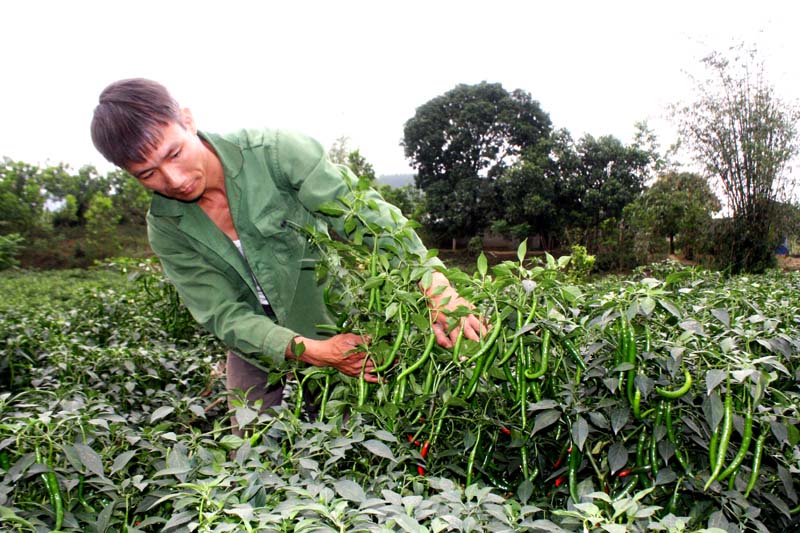
(HBO) – Good earnings from the cultivation of chilli plants have helped people in An Lac commune (Lac Thuy district) find the answer to the question of what plant is best for them.

Bumper chilli harvests brought joy to Pham
Hung’s family and the chilli growers in An Lac’s An Phu village.
Quach Cong Ninh, Chairman of the An Lac
People's Committee, said that following good earnings of the first crop, local
farmers expanded the area under the plant from 3 to 5 hectares. Chilli plants
grow healthily, offering stable output, so everyone is very optimistic.
We accompanied Vu Ngoc Thuong, a local
agricultural official, in a visit to a model garden of growing chillies for
export in An Phu hamlet. Chilli
plants in the 1,140 m2 garden of
farmer Pham Hung were laden with fruits, ready to be picked. Hung grew the
hybrid chilli No. 7 (a hybrid chilli type of Chian), which yields finger-sized fruit
and matches the soil of An Lac. Hung said: "In the first crop, we cultivated 720
m2, but only half of the area bore fruit, as we lacked technical knowledge.
This crop, we doubled the plantation scale. Now we have experience and
knowledge, and our chillies have grown two or three times faster compared to
last year.”
"When we master the technique, it is
not difficult to cultivate the plant," said Hung. "The most important
thing for us is there is a company that provide us with seeds, technical
support and buy our chillies. If market prices increase, the company will raise
their purchase prices, but when market prices are low, it keeps the price at at
least 5,000 VND per kg. At that price, growing chilli plants is already much
more profitable than planting corn and cassava.”
From the beginning of the year, Mr. Hung's
family has had two bumper harvests, and sold the fruit at between 5,000 to
6,000 VND per kg. With an average one harvest every six months, each chilli plan
can yield over 2 kg of fruit.
Apart from Hung’s family, An Phu also has
9 households growing chilli. "Employees of Chili Vietnam Ltd. (which
signed contracts with local chili growers) regularly check and provide
technical support to farmers. If diseases occur, farmers will report to the
company for prompt measures. In addition to An Phu, some other hamlets in the
commune also have potential to follow the model," said Vu Ngoc Thuong.
"Chilli plants are suitable to local
soils, thus output and earnings are guaranteed. In the 2018-20 winter crop, An
Lac will expand the total area under the plant to 10 hectares. In addition to
citrus farming, we have concluded that chilli trees would help people secure a
stable source of income at home," stressed Quach Cong Ninh, chairman of
the An Lac People's Committee.
In Lac Thuy district, communes have been succeeded in promoting their One Commune-One Product (OCOP) products while others are still struggling to position their typical farming products in market. Some communes in the district still fail to have their products met OCOP programme’s requirements, while others have seen their certifications expired.
The inspectorate agency of Hoa Binh province has issued Official Dispatch No. 1090/TTr-PCTN to provincial departments, agencies, localities, business associations, enterprises, and investors regarding measures to improve informal component indexes of the Provincial Competitiveness Index (PCI).
Hoa Binh is taking concrete steps to improve its investment environment, with a strong focus on supporting businesses, settling obstacles for strategic investors, and creating opportunities for robust development in the coming years.
Under the blazing early summer sun, the construction site of Nhuan Trach Industrial Park (IP) in Luong Son district is abuzz with activities from dawn to dusk, a testament to the determination of the investor to meet their construction targets on schedule.



